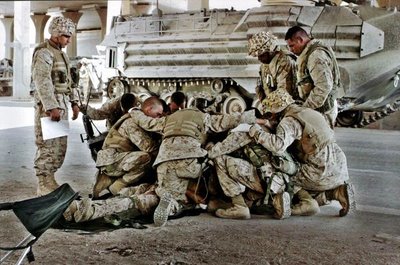
The moment the final midterm election votes were counted, Democrats wasted no time stumping for the withdrawal of American troops from Iraq. However, real conservatives-the normal majority-continue to believe, as we always have, that pulling our forces out prematurely will be a blunder of monumental proportions. It would not only be viewed as frailty on our part, but serve to embolden the enemy and further imperil our nation and its allies. It is the liberal wing of the Democratic Party and their "rush to escape" Iraq that causes great consternation. Conservatives believe it is not really Iraq from which they want to retreat-but from the war itself.
Democrats preach for peace. This is a good thing, but it is neither the answer nor a solution to the death threats that dangle every day over our lives like the Sword of Damocles.
Since the horror of 9/11, liberals would have us believe they support the war in Afghanistan, because that is where the Taliban trained and from where Osama bin Ladin directed or still directs his murder/suicide operations. If we had engaged the Taliban in Afghanistan-and not concurrently expanded the front of the war on terrorism to Iraq-the same peace protesters would be calling for a pull-out of troops from Afghanistan as well. Three and a half years have gone by and the early success in Afghanistan remains, at best, tenuous. With no defined war front or uniformed enemy, the anti-war crowd will always find itself in an apparent quagmire.
We must ask: What then, Democrats? You should not demand we withdraw unless and until you have a bulletproof strategy up your collective sleeve-not some blue sky vision of sitting down with the devil to negotiate a better position in hell.
Speaker of the House-Elect Nancy Pelosi and her liberal colleagues, tend not to think about the ghastly realities with which we are threatened but how they can toss more rhetoric into the air without actually delivering decisive action over the next two years. The bluster and brouhaha surrounding their investigations into past-perceived mistakes does not equal a National Security policy.
At this critical turning point for our nation, Pelosi et al. should remove their rose-colored glasses, turn their attention away from the wholly unrealistic expectations of their "peace without honor" constituents, and concentrate on building up our nation's strengths rather than tearing them down. We cannot protest our way to victory.
Every American, regardless of political persuasion, must accept the realities of our war on terrorism. The enemy has no intention of going away, whether from Iraq, Afghanistan, Lebanon, Iran, Syria, or from inside our own borders. They have but one goal: the destruction of Israel and America. This is burned into their hearts as children and continues until the day they die, taking as many "infidels" with them as they possibly can. This is not some quixotic mission for Allah they are on, but a duty as natural as the wretched air they breathe.
The gravity of this Islamo-fascist indoctrination cannot be dismissed with a knowing smile before Congress or the wasting of taxpayer money on unnecessary partisan investigations. This, like preaching peace, will not bring relief from our fears, and it won't end the war. The enemy we face is terminally serious. They have no timetables, or exit strategies, and are wholly unconcerned with how many of their own people die in order to achieve their ends.
They will not go home until they win.
Democrats preach for peace. This is a good thing, but it is neither the answer nor a solution to the death threats that dangle every day over our lives like the Sword of Damocles.
Since the horror of 9/11, liberals would have us believe they support the war in Afghanistan, because that is where the Taliban trained and from where Osama bin Ladin directed or still directs his murder/suicide operations. If we had engaged the Taliban in Afghanistan-and not concurrently expanded the front of the war on terrorism to Iraq-the same peace protesters would be calling for a pull-out of troops from Afghanistan as well. Three and a half years have gone by and the early success in Afghanistan remains, at best, tenuous. With no defined war front or uniformed enemy, the anti-war crowd will always find itself in an apparent quagmire.
We must ask: What then, Democrats? You should not demand we withdraw unless and until you have a bulletproof strategy up your collective sleeve-not some blue sky vision of sitting down with the devil to negotiate a better position in hell.
Speaker of the House-Elect Nancy Pelosi and her liberal colleagues, tend not to think about the ghastly realities with which we are threatened but how they can toss more rhetoric into the air without actually delivering decisive action over the next two years. The bluster and brouhaha surrounding their investigations into past-perceived mistakes does not equal a National Security policy.
At this critical turning point for our nation, Pelosi et al. should remove their rose-colored glasses, turn their attention away from the wholly unrealistic expectations of their "peace without honor" constituents, and concentrate on building up our nation's strengths rather than tearing them down. We cannot protest our way to victory.
Every American, regardless of political persuasion, must accept the realities of our war on terrorism. The enemy has no intention of going away, whether from Iraq, Afghanistan, Lebanon, Iran, Syria, or from inside our own borders. They have but one goal: the destruction of Israel and America. This is burned into their hearts as children and continues until the day they die, taking as many "infidels" with them as they possibly can. This is not some quixotic mission for Allah they are on, but a duty as natural as the wretched air they breathe.
The gravity of this Islamo-fascist indoctrination cannot be dismissed with a knowing smile before Congress or the wasting of taxpayer money on unnecessary partisan investigations. This, like preaching peace, will not bring relief from our fears, and it won't end the war. The enemy we face is terminally serious. They have no timetables, or exit strategies, and are wholly unconcerned with how many of their own people die in order to achieve their ends.
They will not go home until they win.







